Memories Of Moscow 1980: How Duncan Goodhew Converted Olympic Gold To Victory In Life
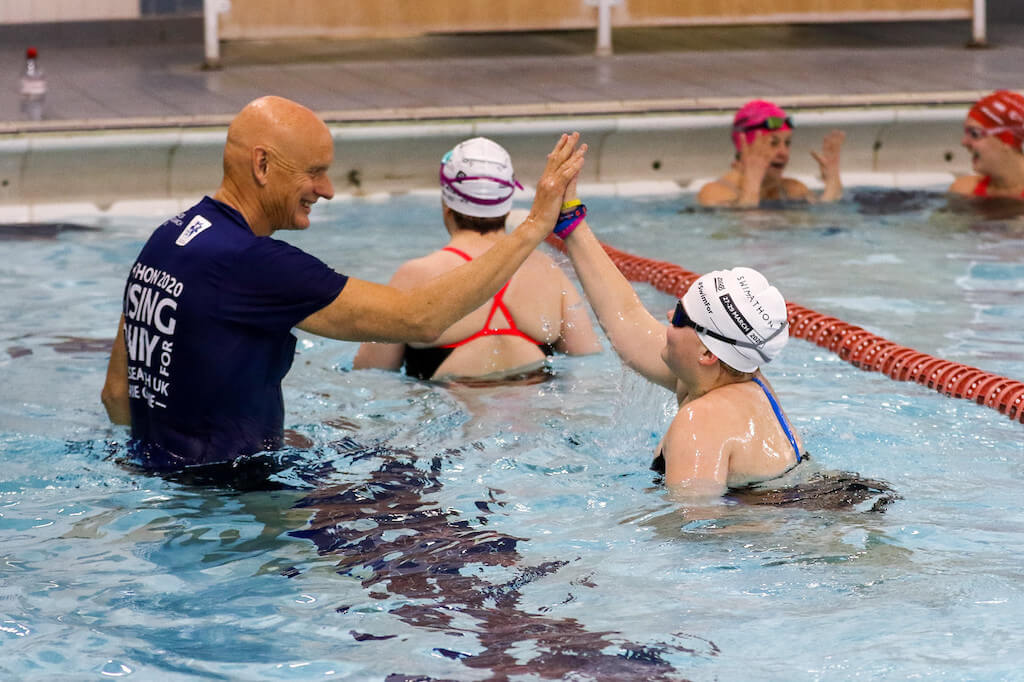
Today marks the 40th anniversary of the third day of racing in the pool at the 1980 Olympic Games in Moscow, where Duncan Goodhew claimed gold in the 100m breaststroke, the message his victory sent to those who had bullied him for his baldness as powerful today as it was back then. Swimming World continues its 40th anniversary coverage of the events of Moscow 1980 and their impact on those who missed out and what the Moscow Games meant for those who made it, even, in some cases, when their Governments did not endorse their participation but their nations did.
Our Moscow 1980 Olympics coverage so far:
- Memories of Moscow 1980: When Barbara Krause Took 100 Free Below 55sec 20 Years Before Her Day In Court With Kipke
- Memories of Moscow 1980 – When Sergei Fesenko Became The First Soviet Swimmer Among Men To Claim Olympic Gold
- Memories of Moscow 1980 – 40 Years Since Boycott Buried The Chances Of Cheryl Gibson & Maple Mates
- Moscow Olympic Flagbearers Max Metzker And Denise Boyd Linked Forever In Australia’s Proud Olympic History
- USOPC CEO Sarah Hirshland to 1980 Olympic Team: ‘You Deserved Better’
- The Moscow Boycott: A Toxic Mix of Sports and Politics Proved Costly for Hard-Working Athletes
One of the legacies of the boycott is the whataboutery – a sport where there is no right answer, agreement or resolution, just endless back and forth.
What if he had been there? What if she had swum? Would they have won anyway? None of us can ever know.
The men’s 100m breaststroke took place without the world’s fastest three men – Gerald Moerken, the West German who held the world record of 1:02.86, and Americans Steve Lundquist and Bill Barrett.
Canadian Graham Smith, the 1978 world silver medallist, was also absent.
Duncan Goodhew did travel to Moscow though as part of the Great Britain team and it was he who emerged the victor four years after finishing seventh in Montreal where John Hencken, of the United States, lowered the world record in heat, semi and final.
Goodhew touched the wall first ahead of Arsen Miskarov, of the Soviet Union, and Australia’s Peter Evans.
His winning time of 1:03.34 was slower than Moerken’s best that year and down on the 1:02.88 and 1:02.93 Lundquist and Barrett clocked a week after the Games – but good for gold and a place in the Olympic pantheon.
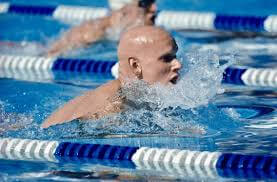
And for all the whataboutery, Goodhew was the one who stood on top of the podium in Moscow and who will forever be called Olympic champion.
It was also a springboard to a lifetime of campaigning against bullying after he had been the subject of teasing at school because he was bald.
If the cause of that was a fall from a tree as a 10-year-old, then his dyslexia provided another incentive for Goodhew to work his way to a position of well-earned respect through achievement.
Goodhew was coached by Dave Haller who also guided David Wilkie to Olympic 200m breaststroke gold and 100m silver in 1976 and David Davies to 1500m freestyle bronze at Athens 2004.
He worked hard and was “a joy to coach”, Haller would say years later. He also had the drive to push on through pain at the moment when that might help him most.
Duncan Goodhew was diagnosed with dyslexia at the age of 13, although he struggled in school long before then. He stated in a BBC interview in 2014: “Often dyslexia had made me feel that I had STUPID in neon light flashing on my forehead. And then my hair fell out so people stared at me because I was so young and bald.”
These two factors had significant negative impacts on his self-confidence, but swimming was, he said “my life preserver and pass from despair and despondency.”
The pool the place where the healing process took place.
He added:
“It was an extraordinary rejuvenating process which culminated in winning gold, driven by so many talented and generous people who seeded and nurtured my dreams and talent.”
This week also marks the 44th anniversary of his first Olympic swim: in the heats of the 100m breaststroke on his way to sixth place in the 100m breaststroke final at the Montreal 1976 Olympic Games, Goodhew set an Olympic record of 1:04.92. In the crowd cheering him on: Her Majesty Queen Elizabeth II.
How Duncan Goodhew Won In and Out Of The Water
Goodhew was born and raised in London, England, but swam for several years in the United States at North Carolina State University while attending business school there.
He completed a degree in business management, a victory for the young Briton who had already overcome so many hurdles. He said:
“Even without winning I’d won. I’d won a far different life to the one I would have lived without swimming.”
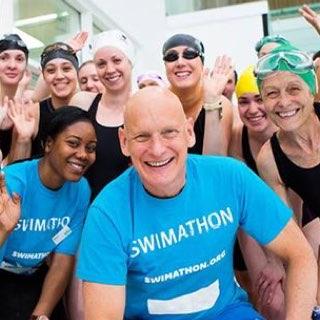
Photo Courtesy: Duncan Goodhew Twitter
Montreal 1976 imbued Goodhew with even more drive and determination and August 1978 proved to be a memorable month.
He won silver behind Graham Smith in the 100 and 200 breaststroke and was part of the England 4×1 medley relay team that came second behind Canada at the Commonwealth Games in Edmonton, Alberta.
Days later the 21-year-old won bronze as part of the Great Britain medley relay at the World Championships in Berlin, then part of West Germany.
Fast forward to Moscow and Goodhew qualified first for the final, taking over the lead on the second 50.
This is how Duncan Goodhew describes the magnitude of his thought process during a split-second in the Olimpiysky Sports Complex:
“I had 25m to go in the final of the 1980 Moscow Olympic 100m breaststroke final. I came up to breathe, with all those thousands of miles of training with me. Miles that meant that some evenings my legs had been too worn out to make the stairs up to bed without stopping.
“Now not only my body was to be tested but my mind. How well had I been prepared? I was less than 15 strokes – 15 seconds, the time it takes me to get milk from the fridge in the morning, away from knowing whether I’d be an ‘almost’ for the rest of my life or an Olympic gold medallist.
“My head rose and my eyes cleared and I saw the iconic black cross at the end of the pool just 25m, 15 short strokes – 15 seconds away. The black cross I’d spent endless hours visualising, imagining that if I concentrated hard enough I could actually pull it and the end of the pool towards me shortening the distance I would have to swim.
“The exercise had two purposes – to create focus, banning other thoughts and distractions from my mind and the focus enhancing the sense of speed moving forward and creating a self-fulfilling cycle: ‘I feel like I’m swimming fast so I must be. I feel really good about that so I can relax and enjoy myself and heck why don’t I swim even faster?’
“My mind was rebelling. My inner voice broke loose and screamed with shrill malice: ‘If you don’t do something right now you’re not going to win.’ But how do you stop thinking?
“My conditioned response kicked in firmly, surely with knowledge, with authority of a certain outcome.
“A result forged in miles and planned and rehearsed over years.”
There was also a bronze medal in the 4×1 medley relay and soon after Goodhew’s swimming career was over.
Leaving The Pool Behind With Variety The Spice Of Life
Duncan Goodhew switched his attention to winter sport and represented Great Britain in the two and four-man bobsleigh at the European Championships in 1981 and was awarded with an MBE in 1983 for services to sport.
He also turned his attention to the corporate world and adapted the lessons learnt in the pool to assist business teams find inspiration and effective ways to overcome the obstacles to success by improving personal and team performance.
He has worked with hundreds of leading businesses and organisations including IBM and PricewaterhouseCoopers and his business experience stretches from arranging large sponsorship to corporate fundraising and business introductions.
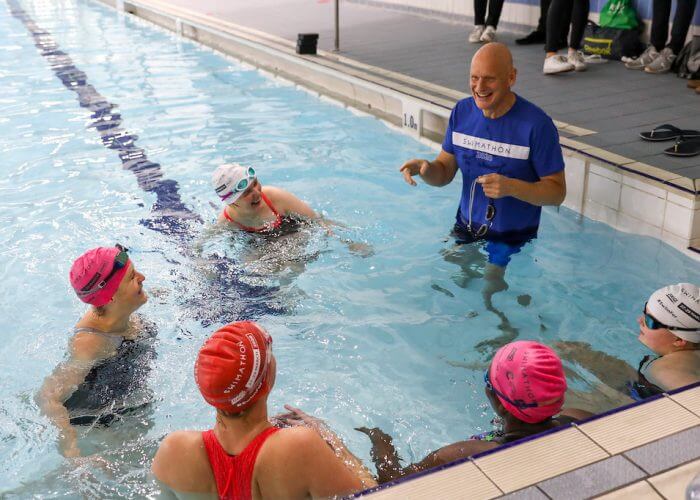
Photo Courtesy: Swimathon
In his book ‘Sink or Swim’ Goodhew draws on the events of his own life and the long and arduous grind of training where your skills will be judged on a performance which is over in little over a minute.
Goodhew became president of Swimathon in 1988, leading the fundraising of more than £10 million for worthy causes at participating pools across Britain.
He is also a key figure in encouraging schoolchildren to swim, promoting the importance of swimming being a life skill, how fun it is and also recognising the physical and mental health benefits associated with swimming.
All the time he has been open about the bullying he experienced but said:
“In fact being bald really helped as I was so accustomed to being stared at, that being stared at for winning would not bother me at all. Go ahead stare all you like.
“The childhood misery was about to have a silver lining.”
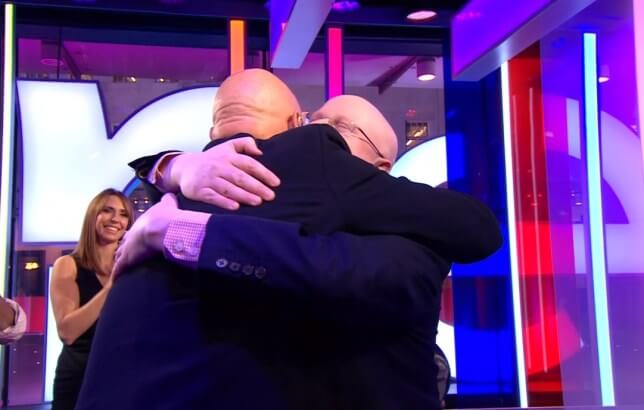
Photo Courtesy: BBC
He has also helped British celebrities including Matt Lucas of comedy programme ‘Little Britain’ who lost his hair at the age of six.
Lucas said he had reached out to Duncan Goodhew and explained:
“He sent me a lovely handwritten letter and some badges and one said Bald is Beautiful… and I wore it and I kept that letter.”
Lucas also said on the BBC One Show that he managed to negotiate childhood because of Goodhew.
“People used to say [to Goodhew] ‘why did your hair fall out?’ and he used to say ‘I fell out of a tree’,” said Lucas.
“And when people used to say ‘why did your hair fall out?’ [to me], I said ‘well, you know Duncan Goodhew fell out of a tree? Well it was my head he landed on. The shock made my hair fall out…’”
Duncan Goodhew made a surprise appearance on the show as Lucas was speaking, the pair embracing.
And in true This Is Your Life style, it turned out that Duncan himself was waiting in the wings to meet Matt for the very first time and give him a brand new badge to add to his collection.
Lucas said:
“This is a wonderful moment for me, we’ve never met.
“You meant so much to me growing up and you gave me so much courage.”




Duncan is a shining example to us all!
A kind person with clear tenacity.
Thank you for this article